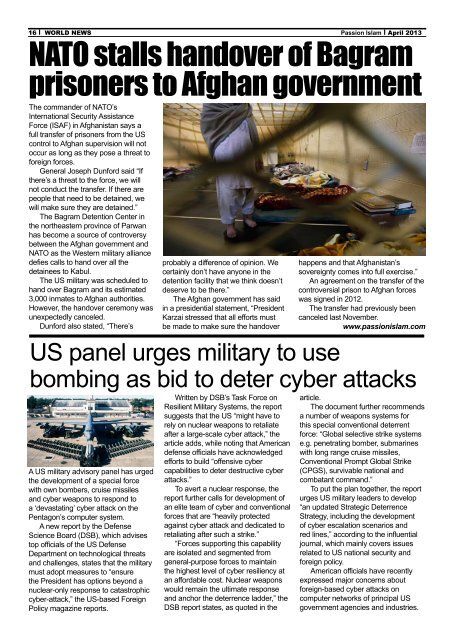Create successful ePaper yourself
Turn your PDF publications into a flip-book with our unique Google optimized e-Paper software.
16 I WORLD NEWS <strong>Passion</strong> Islam I <strong>April</strong> 20<strong>13</strong><br />
NATO stalls handover of Bagram<br />
prisoners to Afghan government<br />
The commander of NATO’s<br />
International Security Assistance<br />
Force (ISAF) in Afghanistan says a<br />
full transfer of prisoners from the US<br />
control to Afghan supervision will not<br />
occur as long as they pose a threat to<br />
foreign forces.<br />
General Joseph Dunford said “If<br />
there’s a threat to the force, we will<br />
not conduct the transfer. If there are<br />
people that need to be detained, we<br />
will make sure they are detained.”<br />
The Bagram Detention Center in<br />
the northeastern province of Parwan<br />
has become a source of controversy<br />
between the Afghan government and<br />
NATO as the Western military alliance<br />
defies calls to hand over all the probably a difference of opinion. We happens and that Afghanistan’s<br />
detainees to Kabul.<br />
certainly don’t have anyone in the sovereignty comes into full exercise.”<br />
The US military was scheduled to detention facility that we think doesn’t An agreement on the transfer of the<br />
hand over Bagram and its estimated deserve to be there.”<br />
controversial prison to Afghan forces<br />
3,000 inmates to Afghan authorities. The Afghan government has said was signed in 2012.<br />
However, the handover ceremony was in a presidential statement, “President The transfer had previously been<br />
unexpectedly canceled.<br />
Karzai stressed that all efforts must canceled last November.<br />
Dunford also stated, “There’s be made to make sure the handover<br />
www.passion<strong>islam</strong>.com<br />
US panel urges military to use<br />
bombing as bid to deter cyber attacks<br />
A US military advisory panel has urged<br />
the development of a special force<br />
with own bombers, cruise missiles<br />
and cyber weapons to respond to<br />
a ‘devastating’ cyber attack on the<br />
Pentagon’s computer system.<br />
A new report by the Defense<br />
Science Board (DSB), which advises<br />
top officials of the US Defense<br />
Department on technological threats<br />
and challenges, states that the military<br />
must adopt measures to “ensure<br />
the President has options beyond a<br />
nuclear-only response to catastrophic<br />
cyber-attack,” the US-based Foreign<br />
Policy magazine reports.<br />
Written by DSB’s Task Force on<br />
Resilient Military Systems, the report<br />
suggests that the US “might have to<br />
rely on nuclear weapons to retaliate<br />
after a large-scale cyber attack,” the<br />
article adds, while noting that American<br />
defense officials have acknowledged<br />
efforts to build “offensive cyber<br />
capabilities to deter destructive cyber<br />
attacks.”<br />
To avert a nuclear response, the<br />
report further calls for development of<br />
an elite team of cyber and conventional<br />
forces that are “heavily protected<br />
against cyber attack and dedicated to<br />
retaliating after such a strike.”<br />
“Forces supporting this capability<br />
are isolated and segmented from<br />
general-purpose forces to maintain<br />
the highest level of cyber resiliency at<br />
an affordable cost. Nuclear weapons<br />
would remain the ultimate response<br />
and anchor the deterrence ladder,” the<br />
DSB report states, as quoted in the<br />
article.<br />
The document further recommends<br />
a number of weapons systems for<br />
this special conventional deterrent<br />
force: “Global selective strike systems<br />
e.g. penetrating bomber, submarines<br />
with long range cruise missiles,<br />
Conventional Prompt Global Strike<br />
(CPGS), survivable national and<br />
combatant command.”<br />
To put the plan together, the report<br />
urges US military leaders to develop<br />
“an updated Strategic Deterrence<br />
Strategy, including the development<br />
of cyber escalation scenarios and<br />
red lines,” according to the influential<br />
journal, which mainly covers issues<br />
related to US national security and<br />
foreign policy.<br />
American officials have recently<br />
expressed major concerns about<br />
foreign-based cyber attacks on<br />
computer networks of principal US<br />
government agencies and industries.














